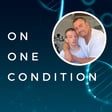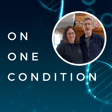Become a Creator today!Start creating today - Share your story with the world!
Start for free
00:00:00
00:00:01

Episode 35: Rachel Vanni - GA2
Rachel's daughter, Charlie, was born with the rare condition GA2 (Glutaric Aciduria type 2). It was identified very early on thanks to newborn screening, but unfortunately it has a very poor prognosis when diagnosed so early. We talk about how GA2 affected Charlie, the importance of communities for parents dealing with such conditions, and the benefits of grief counseling. Rachel also shares the beautiful life lesson Charlie has taught her.
The song Rachel selected is I reach for the sky by Social Distortion.
Transcript
Introduction to the Podcast and Guest
00:00:00
Speaker
Hi, I'm Sylvain Bartero, and you're listening to On One Condition, a podcast to raise awareness about health conditions by listening to people who leave them every day. Today, my guest is Rachel Vani, and we're going to talk about her daughter, Charlie, and Lutaric Acidaria Type 2.
00:00:22
Speaker
Hi, Rachel. Thanks for joining me. It's a pleasure to have you on the podcast. How are you? I'm doing great. Thank you so much for having me on. As you know, I love starting with a song. Which song did you choose and why?
00:00:39
Speaker
Yeah, the song that I chose was Reach for the Sky by Social Distortion. It's a song that just keeps popping up in my life in the perfect times. And it reminds me to really live life to the fullest because we don't know what tomorrow will bring. And it just it just keeps popping up in those moments where I need that reminder.
00:01:05
Speaker
Nice. That's what I love about music, that sometimes you don't know where it comes from, but it will be there when you need it to remind you of something specific. So I love that. Yeah, thank you.
Charlie's Diagnosis and Initial Challenges
00:01:21
Speaker
So we're talking about your daughter, Charlie, and I want to let you start where you think it makes sense to share her story and yours.
00:01:34
Speaker
Sure. Um, probably makes sense, uh, to start from when she was born because, uh, shortly after her birth, which was very normal and beautiful, um, it was, uh, a little bit, I would say that there's no other word for just traumatic. And the way that we found out that she had this rare disease, uh, she went into a full blown metabolic crisis, um, about 20 hours after she was born and
00:02:04
Speaker
At first, they didn't know what was going on, but thankfully in California, her condition was covered under the newborn screening. So shortly after this occurred, we got the results back that she likely had this disease called Gluteric Aciduria type 2, and we were able to get treatment started very quickly. And so it has a very poor prognosis when it's diagnosed so early.
00:02:33
Speaker
So we were told very quickly you would be lucky to get a year with her. Okay, wow. How does that feel? I can't quite get my mind around it when you're told that. What was your reaction?
00:02:51
Speaker
I mean, to go from, you know, um, the expectation that the whole time that you go through pregnancy and you expect everything to just be great. I mean, it was a naive way of thinking now back, you know, but I was younger. I was like, Oh, of course everything is going to be totally fine and nothing bad is going to happen. But you know, we didn't quite expect
00:03:15
Speaker
a rare disease to occur, of course. So I think it was just really surprising. I think I was trying to wrap my head around the fact that we had just gotten this very rare diagnosis and trying to make sense of it. I think whenever you
00:03:32
Speaker
encounter this type of situation, your brain is just trying to make sense. And sometimes life just doesn't make sense. Sometimes things just happen. So I think I was trying to just trying to piece everything together at that moment. And part of me
00:03:50
Speaker
I feel like sometimes I've always been the stubborn person and the person who doesn't take these answers that face value. So I was like, no, she's not going to just live a year. We're going to get past this. We're going to find a solution. And I think a lot of parents that I've met that have children with rare diseases share that same sentiment.
00:04:12
Speaker
Yeah. And it's especially difficult with rare diseases because unfortunately, a lot of them have no treatment, no cure. You may agree or not agree, but it's a personal fight to actually try to find something that will help you to relate with this personal fight situation.
00:04:37
Speaker
Absolutely.
Managing Metabolic Disorder: Treatment and Insurance Issues
00:04:39
Speaker
While with her particular disorder, it's metabolic. So the treatment is all in what she's eating. And at the time she couldn't eat. So she had a G-tube and we had to do metabolic formula that was very, very expensive. And getting that covered by insurance was also a fight.
00:05:01
Speaker
But her treatments consisted mainly of supplements and formulas, but there's a meaningful treatment in the way of ketones, supplementing ketones, because her disorder interrupts the fatty acidation.
00:05:19
Speaker
it's not available in the United States it's available and very common treatment for this disorder in the UK and Australia and other countries but in the United States it's not and so we had to
00:05:36
Speaker
seek out help online in a Facebook group to try and get access to this medication. We were able to, thanks to some wonderful other mothers who had children with this disorder, we were able to get our hands on some of it
00:05:54
Speaker
get it shipped over from Australia and try it just to see if it would be effective. It ended up not being like the magic solution that we were hoping for, but it did, I think, help in some ways.
00:06:08
Speaker
Okay. Going back to what you said to start with that your daughter went into metabolic crisis, what did it do to her? And was it something that happened a lot or did the food help with that?
00:06:28
Speaker
Yeah, so with her disorder, she couldn't fast. So once her body ran out of glucose, essentially, it would just start to break down. She would start having all this acid buildup.
00:06:43
Speaker
and go into metabolic acidosis. So she would need a continual stream of glucose in order to be healthy. So what that looked like, she was having a very hard time feeding as an infant, and she was very lethargic
00:07:04
Speaker
very hypotonic, like her muscles were just very limp with very little muscle tone. And she was breathing extremely fast to try and offset the amount of carbon dioxide in her blood. I'm not a doctor, but this is what I remember being told.
00:07:24
Speaker
She only had those type of crises occur a few times in her life, the worst one being or the worst two when she was shortly after birth and then shortly before she passed.
00:07:40
Speaker
Okay. And does it mean that her body, was she responsive when she was in crisis or not? Not really. I mean, she was very lethargic with bouts of being aware. I mean, the first time she was
00:07:58
Speaker
just born and a lot of infants are sleepy. So I actually didn't even catch it until a lactation consultant came in to help me with feeding because she was having a hard time with feeding.
00:08:11
Speaker
And the lactation consultant came in and noticed immediately that there was something wrong and got the doctor. So it wasn't even me who picked up on it because babies are tired. So it was very subtle. I could totally see if we had gone home, she would not have made it. Really? Okay. And did it affect a development at all?
00:08:36
Speaker
Yeah, so it's hard to say whether it was the crisis when she was born that had damaged her brain slightly or whether it was her condition just in general. But she did have developmental delays. She did not sit up until she was probably about a little over a year old, didn't crawl until she was solidly in her twos and then
00:09:06
Speaker
She kind of defied all logic though, because they told us that she wouldn't even sit up. And when she was three, she took her first steps.
00:09:16
Speaker
She was a fighter and she proved all of them wrong. Nice, nice. Talking about the, you mentioned the
Finding Support and Stabilization
00:09:26
Speaker
Facebook group help. Did you find or get a lot of support from groups from the start or was it difficult to find help to understand how to manage Charlie's condition and help her as much as possible?
00:09:46
Speaker
Yeah, it was kind of a weird situation because in the hospital, we were getting so much conflicting information about her disorder. And it was no fault of the doctors. It's just so rare. And they're pulling information from papers that were probably written 10 years ago and not really understanding the patient's
00:10:13
Speaker
day to day. So I was getting the very medical explanation of what things were like without actually taking into account real life. And so I was referred to this support group, the fatty oxidation family support group on Facebook by a nurse whose child had a similar disorder.
00:10:37
Speaker
And she said, you need to check out this Facebook group. You will get answers there, their support there. So I went and I joined and yeah, I mean, it was just like,
00:10:51
Speaker
all of a sudden I had some sort of foundation of people who really could tell me what things could be like. I mean, I didn't know cause every child is so different in how they present. And, but it gave me hope. It gave me hope that like there were older children. There were children who were living, you know, lives that were full of good memories and you know, there were,
00:11:19
Speaker
of course, difficulties and challenges, but everyone was adapting. And for me, it was all about creating a good quality of life that wasn't just spent in hospitals, which at that point, I'd been in the NICU for several months.
00:11:38
Speaker
And I was very devastated that even if she had lived a year, I just didn't want to spend the entire year in the hospital. I wanted to give her a good quality of life and I was able to see that within the support group. Okay. So she was in the hospital constantly early on then?
00:12:00
Speaker
Early on, we were in and out of the hospital for really that first year until she got her G-tube. And then whenever she got her G-tube, I was able to run a feed, run food to her so she had a continual stream of glucose. And then once we had that,
00:12:22
Speaker
we were able to get out. She was sick a lot less often. We were able to do things a lot easier than it was previously. So then it got better. Then we were actually, we had almost a year and a half without even one visit to the hospital after that. So that was great. Yeah.
00:12:42
Speaker
Yeah. Going back to those Facebook groups, my experience with Facebook groups like this or communities like this is sometimes it can be a bit scary. Was it overall positive or did you find it a bit daunting as well?
00:13:03
Speaker
You know, there's good parts and bad parts. I think there's more good that outweighs the bad for the most part. And I think these groups provide so much support and so much hope, especially when you have a disorder where, you know, the prognosis is poor and there's children that are passing away.
00:13:26
Speaker
It is good in the way that you have this community to lean back on to say, hey, we got you. We understand there's other patients and people in that group that have experienced hardships and challenges and difficulties and loss.
00:13:42
Speaker
And so I think that that is priceless, truly. And I think just people being aware, use them for the support, use them for that emotional side. But I feel like there is a huge need for objective information and advice on rare diseases.
00:14:02
Speaker
Yeah, I fully agree. So you mentioned the prognosis and you said that in a way you are lucky with Charlie because she lived past one, past two, past three, if I remember well. But having this prognosis, do you think it helped you get your head around it and make the best of your time with Charlie?
00:14:31
Speaker
I think it did. I came to the realization that it's really the quality of the life you live, not the quantity. She taught me so much about living in the moment and being present and being appreciative and grateful for the time that you have.
00:14:54
Speaker
And so at first it was extremely hard to be with your child knowing that you never know when the last moment is going to be and that's constantly in your face. But truly, do we ever really know when the last moment is going to be? I mean, we don't, you know, I think you're more aware of it when you have a child or whether you yourself have a disease that is going to shorten your lifespan.
00:15:24
Speaker
Mm hmm.
00:15:25
Speaker
But it really helped me put things into perspective that we don't know when our last moment is going to be. And so we need to really cherish every moment that we have with our children, with our spouse, with our loved ones. And so that really was helpful. I think the other helpful resource that I had that I am so incredibly grateful for was when we came home from the hospital for the first year of her life, I was provided with hospice care.
00:15:55
Speaker
And that was in-home hospice care. We had an in-home nurse that would come once a week. And her name was Cynthia. I still think of her quite often and the impact that she had on me and my family. And she helped so much with, you know, she was a nurse and she was of course there for the medical side, but she helped so much with the emotional side and processing what we were going through.
00:16:21
Speaker
and connecting me with resources that I needed, including therapy. And that I think grief therapy in advance of loss is so important. And so I think those resources helped with that process in getting to the point where I could be okay.
Coping Mechanisms: Therapy and Support Systems
00:16:45
Speaker
And yeah, I just can't speak highly enough of hospice and how important their services are.
00:16:54
Speaker
That's so good to hear that you had the right support because with rare diseases I hear so much about people who don't get that support and who are left to work communities and communities are helpful but at the same time it's people in a similar situation who also need support so you can't necessarily expect
00:17:21
Speaker
the too much from the communities at least from what I hear but mentioning grief therapy and you mentioned hope as well how much hope did you have because with Charlie going beyond one beyond two
00:17:44
Speaker
Did you let yourself hope that she would live much longer or how did you manage that?
00:17:53
Speaker
Yeah, of course. I feel like every parent wants their child to live a full life. And I had hope that that would happen. I didn't know what that would look like. I didn't know what her development would look like. But as she got older and older, I became more and more hopeful because
00:18:17
Speaker
There was a GA2 patient a couple years prior who was an adult, but he got a liver transplant and seemed to be doing rather well after surgery. So I was in the process of speaking with her specialist and finding a hospital that would be willing to do the first pediatric GA2 liver transplant.
00:18:40
Speaker
And when you're the first, it's very complicated because you're essentially just asking and begging in my case. And you have to have a specialist who really can advocate for you. And thankfully we did.
00:18:59
Speaker
We finally got someone interested at UCLA who would be, they said they would be willing to have her go through testing. And unfortunately, by the time that we had gotten there and gotten to that point, it seemed like her disease had progressed too far.
00:19:23
Speaker
where she was no longer eligible. But looking back, I'm not sure if that would have been the best option as far as the quality of life. Again, I think she would have been in the hospital a lot, lot more. And I know I've seen patients that have gone through transplants and had complications and
00:19:51
Speaker
Um, and it's, it's very difficult to, to make that decision one way or the other. I'm not sure if there is a right, quote unquote, right decision, but looking back, I don't, my gut feeling said that, you know, maybe it was because she would have not had a great outcome. And then I would have, would have been kicking myself and never been able to forgive myself if that was the cause.
00:20:16
Speaker
Yeah, yeah, I get that. And you mentioned that her disease had progressed, so how did it progress? Did it have lasting damages on her liver? Is that it?
00:20:31
Speaker
Correct. Yeah. So, um, whenever they went to go do the testing for the liver transplant, she had had a very significant crisis. The, what they said was they couldn't actually get a, a sample from her liver because it was so fatty that they, it just broke apart whenever they would try to sample a tissue from the liver.
00:20:57
Speaker
hearing that just broke my heart. I knew from imaging that her liver was so significantly larger than it should have been. And it was putting pressure on her lungs and it was making it so that she was very uncomfortable and it was hard to breathe. And then her kidneys started shutting down. So
00:21:17
Speaker
it was, she was not urinating. So she started getting ascites and holding onto fluid. And so that was the kind of the downhill progression that occurred, which happens a lot with these particular kids with these rare diseases when they have a very significant metabolic episode.
00:21:42
Speaker
So having been in this situation and having fought through Fort Charlie, is there anything you would tell parents who are in a similar situation about how to approach it or what to do?
Advice for Parents Facing Similar Challenges
00:22:04
Speaker
Yeah. I mean, I feel like it's so just like grief, everyone grieves differently. And even if your child is living, you are grieving the expectations that you had for them. And I think that's important to sit with that because it's okay to feel the grief of that. And I think you have to in order to get to the next step.
00:22:30
Speaker
So I think either looking for resources to do that within whatever way that you feel is the most comfortable for you, whether that's speaking to someone, seeking out resources like books, podcasts, there's so many options out there.
00:22:47
Speaker
I think getting into a support group of some type, it doesn't have to be necessarily a structured support group. It could be your own kind of support. Maybe it's a group of friends that you go out with and you go play a sport. I think just having some sort of support system in place is very, very important.
00:23:10
Speaker
And I think also finding community resources that you can access four times where you are in dire need. For instance, if you are in the hospital in and out, finding a community resource that can help deliver meals or help clean your house or take care of those very
00:23:36
Speaker
outsourcible things while you take care of yourself and your child or your spouse or whoever is affected. I think that's really key in taking stress off where you can. I think in that way you can deal with what you need to. Yeah. Do you have a lot of support from family and friends yourself?
00:24:01
Speaker
Yeah, I do. I was very lucky. I had a great group of friends. I have amazing family support. And I think back on the people that would come and sit with me at the hospital and visit and bring food. There's one memory I have of a friend who
00:24:28
Speaker
I did a jujitsu with and her dad and her and her kids came to the hospital when Charlie was very sick and I just remember her dad dancing to bawana songs in the hospital room and Charlie was just like laughing and we were all laughing and smiling as he's like dancing to that, you know, you're welcome song and
00:24:51
Speaker
Yeah. Those moments really had such a huge impact on my feelings about humanity, I think. Wow, that sounds amazing. How was it after Charlie passed away? Did the grief therapy help? How did you find trying to build
00:25:22
Speaker
not necessarily a new life, but carry on for yourself. Yeah, it was actually, it felt like a new life because it was so weird because I had tied so much of my identity to being a mother as you do. I mean, whenever you have a child, your whole
00:25:48
Speaker
your whole identity has shifted. You're no longer just Rachel, you're Rachel, also someone's mother. And so it was very much having to build a new identity and
00:26:04
Speaker
learning how to deal and live with this pit in my stomach.
Life After Loss: Lessons and Reflections
00:26:12
Speaker
The best way that I can describe to someone, and it only works with someone who has kids, is you know that feeling that you get when you lose your child for a minute. You look around the park, they're not there, and you kind of have that feeling of panic just set in when you can't find them.
00:26:32
Speaker
It's having that, but just perpetually and that feeling of panic that they're not there with you and then learning how to sit with that for the rest of your life. And I know that sounds so terrible, but that's the only way that I can
00:26:49
Speaker
That's the only way that I can put into words how it feels. But grief therapy helped so much. I went immediately into grief therapy after she passed. And I believe that is the reason why I was able to manage through the darkest of times because there were many, many times that I was just like, how do I
00:27:15
Speaker
how do I go on? Like what is the point? But then I went through and thought, you know, life is so precious and Charlie really
00:27:31
Speaker
was a light and she truly appreciated every moment, even when her body didn't work the way that I know she wanted it to. And so I am so grateful for everything that my body can do because I know that there are people who are not in that situation. And so I really do appreciate it because
00:27:55
Speaker
Yeah, I think just going through therapy kind of helped me see how lucky I am to be healthy and to be able to move my body and have also the experience that I had. I'm very grateful for it. I had an amazing daughter who taught me so much. Yeah. Is there one thing that you want to share that she's taught you? What would that be?
00:28:25
Speaker
don't take life too seriously and laughing even whenever things are terrible. Laughing is, there's no reason that you can't laugh at something.
00:28:40
Speaker
Yeah. You know, just smiling, smiling will make any situation better. Even when you don't feel like smiling, the act of smiling will make you feel better. And I think she was always such a goof and she would always make jokes even when we, you know, I know she wasn't feeling good. Um, and so I always try to find a smile or some sort of piece of humor, even whenever there's something really tough going on.
00:29:08
Speaker
Nice. I love that. And I can completely see it. But in a way, it takes courage to let yourself laugh or smile in difficult situations. But you're right. And I think we don't do it enough. We don't enjoy those life moments enough. Absolutely.
00:29:34
Speaker
Well, I always finish on the same question. And usually it's focused on the person who has the condition, but we can't, unfortunately. But I'll address that question to you. What's your happy place, a place where you feel at peace?
00:30:01
Speaker
It would definitely be near the ocean. I'm very lucky to live in a beautiful place where I can go to the ocean, but it's always been whenever I'm stressed out, I'm having a hard time.
00:30:16
Speaker
I'll drive and just go to the ocean and just sit and listen to the waves. I think it's a reminder that for me, no matter what, there's always going to be another wave. There's always going to be a new start. There's always going to be an opportunity to do something different. And I think the constant of that
00:30:45
Speaker
is really helpful whenever things feel so permanent. There's so much spirituality that comes from you. I can really feel it. It's amazing. Well, thank you so much, Rachel. I really appreciate your time.
00:31:07
Speaker
I've written down one thing that I'm going to take away from our discussion, which is living in the moment. And you're right, you never know when the last moment is. So you need to enjoy every single moment you have as much as you can, and you need to smile and laugh. Thank you. Thank you for those life lessons. Thank you very much.
00:31:35
Speaker
Yeah, thank you so much for having me. This has been a great conversation.


















